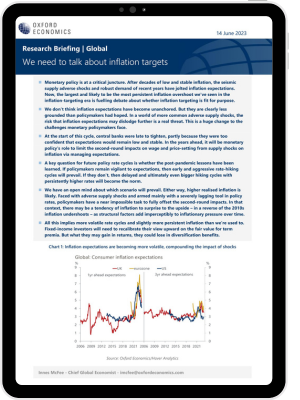We need to talk about inflation targets

Monetary policy is at a critical juncture. After decades of low and stable inflation, the seismic supply adverse shocks and robust demand of recent years have jolted inflation expectations. Now, the largest and likely to be the most persistent inflation overshoot we’ve seen in the inflation-targeting era is fuelling debate about whether inflation targeting is fit for purpose.
We don’t think inflation expectations have become unanchored. But they are clearly less grounded than policymakers had hoped. In a world of more common adverse supply shocks, the risk that inflation expectations may dislodge further is a real threat. This is a huge change to the challenges monetary policymakers face.
At the start of this cycle, central banks were late to tighten, partly because they were too confident that expectations would remain low and stable. In the years ahead, it will be monetary policy’s role to limit the second-round impacts on wage and price setting from supply shocks on inflation via managing expectations.
Tags:
Related posts

Post
The latest export from China is … deflation
We expect Chinese export price deflation to provide a helpful tailwind in the struggle to bring EM inflation back to target.
Find Out More
Post
Cross Asset: Closing our tactical long on gold, but we’re still bullish
The strength of the recent gold price rally has defied even our already bullish expectations and we think prices are vulnerable to a price consolidation in the short term. As a result, we close out our tactical long position on gold that we opened in October last year.
Find Out More
Post
How Inflation eroded governments’ debts and why it matters | Beyond the Headlines
The supply-shocks era (2020-23) represented the first time in a generation where inflation significantly eroded the real value of global public debt. In this week’s video, Gabriel Sterne, Head of Global Emerging Markets, focuses on the extent to which governments seized that opportunity.
Find Out More